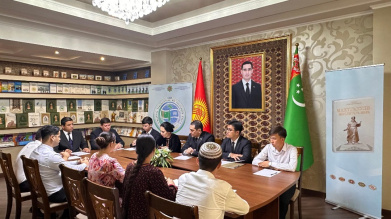Turkmenistan and Japan signed a solid package of agreements
16.04.2025 | 04:20 |The second day of the visit of President of Turkmenistan Serdar Berdimuhamedov to Japan was marked by the signing of an impressive package of bilateral agreements and memorandums. The documents cover a wide range of areas - from industry and energy to education, ecology and water management, which indicates a systematic approach to the development of the Turkmen-Japanese partnership.
The most significant of the signed documents were framework agreements with leading Japanese and Turkish companies for the implementation of large industrial facilities.
These are such significant infrastructure projects for the economy as the construction of a second plant for processing natural gas into gasoline in the Ahal velayat with the participation of Kawasaki Heavy Industries, Itochu Corporation and Rönesans, as well as the creation of a new carbamide plant with a capacity of more than a million tons per year in the village of Kiyanly together with Mitsubishi Heavy Industries, Mitsubishi Corporation and Gap Inşaat.
The same group of large projects includes the overhaul of the Kiyanly Polymer Plant with the involvement of Toyo Engineering and Rönesans. These documents are not only evidence of the continuation of Turkmenistan's industrialization policy, but also a direct investment in the technological renewal of the economy based on high Japanese standards.
The energy agenda with an emphasis on the "green transition" was not ignored either. This is evidenced by the agreement signed between the Ministry of Energy of Turkmenistan and Sumitomo Corporation on the transfer of gas power plants from an open cycle to a more efficient combined cycle.
In addition, a memorandum was signed with Muroosystems, which is another signal of Turkmenistan's interest in modernizing the energy infrastructure.
In addition, a memorandum was signed with Muroosystems, which is another signal of Turkmenistan's interest in modernizing the energy infrastructure.
A whole block of agreements concerns academic exchange and cooperation in the scientific and educational sphere. Thus, Turkmen universities - Oguz Khan Engineering and Technology University, the Institute of International Relations and the Institute of World Languages - signed memorandums with Tokyo Boeki Eurasia, Tohkemy, as well as with the Nippon and JACAFA funds.
Such documents, of course, serve to strengthen the legal framework for opening new opportunities for internships, exchange programs and joint research projects.
The solution of environmental and water resources issues, which are the focus of sustainable development, were reflected in the documents signed in Japan. Thus, during the visit, an agreement was signed on cooperation with Chuo University, aimed at improving the greenhouse gas inventory and reporting under the Paris Agreement.
Agreements were also reached with Kubota on water management and with Sumitomo Heavy Industries in the context of the development of the city of Arkadag.
An important part for the promotion of Turkmen-Japanese cooperation was the signing of an agreement between the State Bank for Foreign Economic Affairs of Turkmenistan and the Japan Export and Investment Insurance Agency. This creates additional financial support for future large projects.
In total, 17 documents were signed during the second day of President Serdar Berdimuhamedov's visit to Japan. Of these, 11 were between government agencies and companies, and 6 were educational and humanitarian in nature.
Thus, a solid package of agreements demonstrates that relations between Turkmenistan and Japan have reached a new level. Technology, industry, education, and sustainable development are the key priorities of this partnership.
Moreover, Turkmenistan is not just looking for investors, but is building a strategic dialogue that implies mutual benefit and long-term cooperation.
ORIENT











